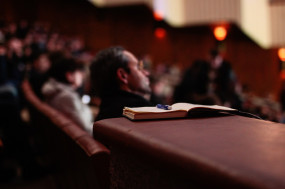
WORKSHOP
"Genealogy(ies) and Deconstruction(s) of Modernity: Crossed Perspectives
led by Raffaele Carbone, Fellows 22/23 of the Institute and Luis Mora Rodriguez, Director of the Institute.
Tuesday 19 and Wednesday 20 March 2024
Open to the public upon registration via this link
https://forms.gle/MgewFNKHHPDjaoNB7
SUMMARY:
The idea of modernity has been the subject of much thought and discussion.
discussed. In the course of the twentieth century, many thinkers (from Heidegger to Blumenberg, from Sartre to Foucault) have sought to define modernity and recapture its spirit. Some authors - notably Weber - have tried to rethink the conventional narrative of Western modernity by emphasising the ’disenchantment’ of the world: from this perspective, the advent of modernity is characterised above all by the development of a progressive rationalisation of all spheres of life. Others have sought to identify the defining mark of modernity, capable in itself of explaining the essential phenomena of the Modern Age (for Heidegger, for example, representation is the defining feature of the Modern Age). Still others, following in Marx’s footsteps, have questioned what is at stake in modern philosophy as it relates to the economic, political and social transformations of modernity (as in the case of Lukács, Horkheimer and Adorno).
However, in today’s world, the question of modernity - its genealogy(ies), its presumed essence - cannot be addressed without confronting the decolonial paradigm. Authors who claim to be part of this paradigm have undertaken a genuine challenge to the European concept and narrative of ’modernity’ by bringing its hidden face to light. Yet, according to decolonial thinkers (Dussel, Quijano, Mignolo, etc.), the authors who develop a critique of Western modernity have not really questioned the colonial horizon in which modern subjectivities are constituted. In this respect, we need to look at the dynamics of power and the cultural mechanisms that have contributed to the emergence of the category of modernity and the concepts associated with it (rationality, rationalisation, the market, etc.), drawing not only on the analytical keys and intellectual tools of critical theory but also on those of decolonial thought.
According to Dussel, modernity is a European phenomenon, but it is rooted in a dialectical relationship with a non-European otherness that is its ultimate material. Indeed, "modernity" as a new model of everyday life and knowledge emerged at the end of the fifteenth century in relation to the control of the Atlantic: the modern Cartesian ego cogito, whose links with the constitution of the bourgeois mentality Horkheimer shows ("Théorie traditionnelle et théorie critiqué", 1937), was pre-empted by the Spanish-Portuguese ego conquiro. According to Dussel, modernity is therefore a paradoxical event in which emancipation and colonisation are intertwined - the latter constituting the dark (and hidden) side of modernity.
On the basis of this theoretical horizon and the political and cultural issues it encompasses, the colloquium aims to take stock of some of the urgent questions debated in decolonial thought, to take a fresh look at the relationship between the decolonial approach and the critical theory of the European tradition, and to rethink some of the later reconstructions that gave rise to the ’myth of modernity’ (Dussel).
PROGRAMME :
• Tuesday 19th March
14:00 - Welcome of participants
Opening remarks by Luis Mora Rodriguez (IEA Nantes) and Alain-Patrick Olivier (Collège International de Philosophie)
14:15 - Raffaele Carbone (Università di Napoli Federico II/Collège International de Philosophie)
Introduction: the decolonial approach as a key to understanding modernity
Session 1
Decolonial thought: the current state of play and current discussions
Session chaired by Luis Mora Rodriguez (University of Costa Rica/IEA de Nantes)
14:45 - Laura Catelli (Instituto de Estudios Críticos en Humanidades, Universidad Nacional de Rosario-CONICET, Argentina)
Mestizaje y colonialidad. Notas sobre raza, sangre y sexualidad
15:15 - Elsa Dorlin (Toulouse Jean Jaurès University)
With what library and in what language do we think about decoloniality? Decolonial criticism and black Guyanese-Caribbean radicalism
3.45pm - Discussion and break
16h30 - Pauline Vermeren (LCSP-Université Paris Cité/Collège International de Philosophie)
Race, modernity and decolonial theory in philosophy
17h00 - Karina Bidaseca (University of Buenos Aires/University of San Martin & CONICET, Argentina)
Poetics of the relationship, immersive landscapes and the right to opacity
17h30 - Discussion
20:00 - Conference dinner
• Wednesday 20th March
Session 2
Modernity, critical theory and decolonial thought
Chair:
Alain-Patrick Olivier (Nantes University/International College of Philosophy)
9:30 - Luca Scafoglio (Università di Salerno)
Domination and the Land: The Conquest as a Matrix of Modernity - Between Critical Theory and Decolonial Option
10:00 - Livio Boni (Collège International de Philosophie)
A Frankfurt man in India: an introduction to the work of Ashis Nandy
10:30 Discussion and break
11:15 - Alejandro José de Oto (Consejo Nacional de Investigaciones Científicas y Técnicas/Conicet, Argentina)
Coloniality and historiography. The politics of time / Colonalidad e historiografia. Las políticas del tiempo
11:45 - Raphaël Barbey (Académie de Nantes), Claude Bourguignon Rougier (translator), Mathieu Renault (Université Toulouse Jean Jaurès), Guillaume Sibertin-Blanc (Université Paris 8 - Vincennes Saint-Denis)
The mythologies of 1492
12.15pm - Discussion
12.45pm - Conference lunch
Session 3
Philosophy and sociology through the prism of decolonial theory: two case studies
Chair:
Raffaele Carbone (Università di Napoli Federico II)
2.30 pm - Leonardo Moreira (Université Paris 1 Panthéon-Sorbonne)
Rousseau, anti-colonialism and the theory of non-domination
15:00 - Edoardo Massimilla (Università di Napoli Federico II)
Se e in che senso ’la sociologia storica’ di Max Weber può dirsi eurocentrica?
15:30 - Discussion
16h00 - Luis Mora Rodriguez (University of Costa Rica/IEA de Nantes)
Conclusion
16:30 End of the conference
Conference organised with the support of the Institut d’études avancées de Nantes, the Collège International de Philosophie and the University Federico II of Naples.

